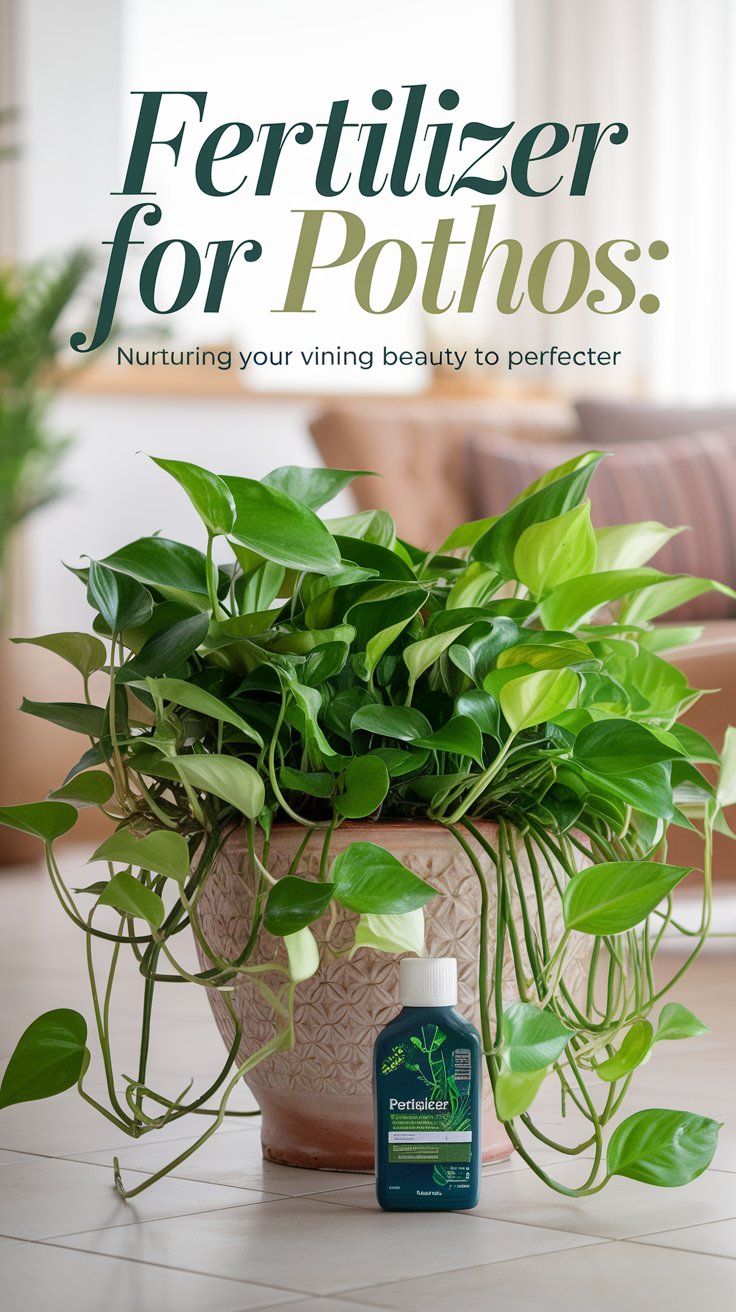Discover the Best Fertilizer for pothos in 2024. Learn expert tips on nutrient ratios, application methods, and organic alternatives to keep your pothos lush and vibrant all year round.
The ideal fertilizer for pothos is a balanced, water-soluble formula with an NPK ratio of 10-10-10 or 20-20-20, applied monthly during the growing season. Organic options like compost tea or fish emulsion can also promote healthy growth. Proper fertilization, combined with adequate light and watering, helps pothos thrive as low-maintenance houseplants or outdoor vines in suitable climates.

Hello, I’m Ashley Scott, a horticulturist specializing in indoor plants and tropical species. With over 15 years of experience, I’ve helped countless plant enthusiasts nurture their pothos to achieve stunning, lush growth. Today, I’m excited to share my expertise on fertilizing pothos, one of the most popular and adaptable houseplants.
Understanding Pothos Nutritional Needs
Pothos, scientifically known as Epipremnum aureum, is a versatile vine native to Southeast Asian forests. While it’s known for its ability to thrive in low-light conditions and withstand occasional neglect, proper fertilization can significantly enhance its growth and appearance.
Key nutrients for pothos include:
- Nitrogen (N): Promotes leaf growth and vibrant green color
- Phosphorus (P): Supports root development and overall plant health
- Potassium (K): Enhances disease resistance and helps regulate water uptake
Choosing the Right Fertilizer for Pothos
Synthetic Fertilizers
The best fertilizer for pothos is typically a balanced, water-soluble formula. Look for NPK ratios such as:
- 10-10-10
- 20-20-20
- 5-5-5 (for more frequent application)
These balanced formulas provide equal parts of essential macronutrients, supporting overall plant health. The University of Florida IFAS Extension recommends using a water-soluble fertilizer for most houseplants, including pothos.
Organic Alternatives
For those preferring natural options, consider these organic fertilizers for pothos:
- Compost tea: A nutrient-rich liquid made from steeping compost in water
- Fish emulsion: High in nitrogen, excellent for promoting lush foliage
- Worm castings: A slow-release fertilizer that improves soil structure
Organic fertilizers not only nourish your pothos but also contribute to overall soil health, making them an excellent choice for eco-friendly gardening enthusiasts.
/how-to-make-comfrey-fertilizer/
Fertilizer Application Tips
Frequency and Timing
- During the growing season (spring and summer): Fertilize monthly
- In fall and winter: Reduce frequency to every 6-8 weeks or stop entirely
Always follow the manufacturer’s instructions, as over-fertilization can harm your pothos.
Application Methods
- Liquid fertilizers: Dilute in water and apply during regular watering
- Slow-release pellets: Sprinkle on the soil surface and water in
- Foliar feeding: Mist diluted fertilizer directly onto leaves (use sparingly)
The Royal Horticultural Society suggests that less is often more when it comes to fertilizing houseplants like pothos.
Signs of Nutrient Deficiency in Pothos
Watch for these indicators that your pothos might need fertilizer:
- Yellowing leaves (chlorosis): Often a sign of nitrogen deficiency
- Slow growth: May indicate overall nutrient deficiency
- Small new leaves: Could suggest a lack of nitrogen or other essential nutrients
Innovative Fertilization Techniques for 2024
Smart Fertilizer Systems
New IoT-enabled plant care systems can automatically dispense the right amount of fertilizer based on soil moisture and nutrient levels. These smart indoor gardening solutions are perfect for busy plant parents.
Microbial Inoculants
Enhance nutrient uptake by incorporating beneficial microorganisms into your pothos care routine. These products work symbiotically with plants to improve overall health and resilience.
Customized Nutrient Blends
Some companies now offer tailored fertilizer blends based on your specific pothos variety and growing conditions. These personalized plant nutrition plans can optimize growth and address any specific deficiencies.
Fertilizer and Water Quality
The quality of water used to dilute fertilizers can impact nutrient availability. If you have hard water, consider using filtered or distilled water when applying fertilizer to ensure optimal nutrient uptake.
/how-to-make-comfrey-fertilizer/
Pothos as Air-Purifying Plants
While fertilizing your pothos for lush growth, remember that these plants are excellent natural air purifiers. A study by NASA found that pothos effectively remove indoor air pollutants, making them not just beautiful but also beneficial for your home environment.
Fertilizer Considerations for Variegated Pothos
Variegated pothos varieties, such as the popular Marble Queen or N’Joy, may have slightly different fertilizer needs. These plants often grow slower than their solid green counterparts and may require less frequent fertilization to maintain their unique coloration.
Eco-Friendly Fertilizer Practices
To align with sustainable gardening trends:
- Use organic, locally-sourced fertilizers when possible
- Practice proper dosage to prevent nutrient runoff
- Consider making your own compost for a sustainable fertilizer source
Troubleshooting Over-Fertilization
Signs of over-fertilization include:
- Brown leaf tips or edges
- White crust on soil surface
- Wilting despite adequate watering
If you suspect over-fertilization, flush the soil thoroughly with water and hold off on fertilizing for several weeks.
Conclusion
Proper fertilization is key to maintaining a healthy, vibrant pothos plant. By understanding your plant’s needs and using the right fertilizer at appropriate intervals, you can enjoy lush, trailing vines that brighten any space. Remember, while fertilizer is important, it’s just one aspect of plant care – always balance it with proper light, watering, and overall attention to your pothos’s well-being.
For more gardening tips and plant care guides, visit usagardenhub.com
/peggy-martin-climbing-rose/

